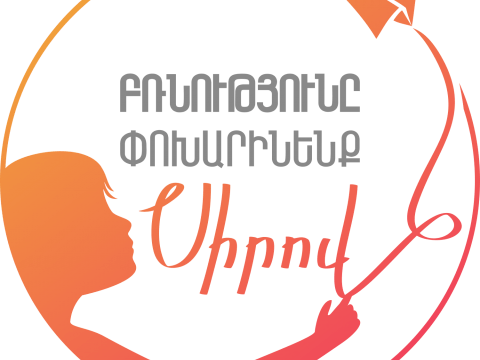World Vision unites major child protection actors in Armenia within ‘Share love not violence’ public campaign to end violence against children

Ten major child-focused organizations in Armenia are united within a unique partnership to launch ‘Share Love, not Violence” public campaign that aims to promote prevention and elimination of violence against children and comprehensive rehabilitation of children exposed to violence in Armenia.
World Vision in Armenia started the dialogue with the partners within World Vision’s “It takes a world to end violence against children’ global campaign months ago, voicing the threatening statistics regarding the physical and psychological violence against children in Armenia.
The public campaign coordinated by World Vision in Armenia, involves UN Children’s Fund Armenia, Save the Children International Armenia Country Office, SOS Children’s Villages Armenia, Children of Armenia Fund, Civil Society Institute, Child Protection Network, Family and Community NGO, Children’s Support Center of Fund for Armenian Relief, Staff of Human Rights Defender.
“We can now proudly state that there is an unprecedented partnership established around child violence issue in Armenia, where the major child protection actors in the country, as well as mass media partners are united around this important cause and equally share the responsibility for the success of the campaign. I am more than certain, that due to this collaboration, we will state a completely positive picture by the end of the campaign”, - says World Vision Armenia Programme Director Zhirayr Edilyan.
Public campaign in Armenia pursues a number of objectives, namely;
● Prevent and reduce physical and psychological abuse applied against children in Armenia,
● Reform the legislation, in particular circulating draft law “On domestic violence” and related legal acts, draft Criminal Code and Criminal Procedure Code,
● Promote effective operation of the system and policy targeted at elimination of child abuse,
● Improve social practices and norms,
● Promote comprehensive rehabilitation of a child exposed to violence,
● Promote creation of a favorable environment in the family, general education institutions and society for full and harmonious development of children,
● Enshrine child protection issues as a priority on the agenda of major donors.
Through an info-graphic video, printed materials, a pop-song and video clip, the campaign targets transformation of social practices and norms in the country. One of the most important achievements by the launch of the campaign is the created educational website – www.mankutyun.am – which aims to become a resource centre where every parent, teacher, child protection specialist and a child can find useful information, scientific studies and researches on non-violent disciplines, practices, as well as useful statistics, legislation, a number of handy tips on positive parenting and peaceful interaction with peers.
***
Key statistical data regarding child violence in Armenia:
· Seven in 10 children experience some form of psychological or physical punishment (six-14 age group).
· Around 40% of children in Armenia experienced some form of physical punishment
· About one in three children under age of one experiences physical and/or psychological aggression.
· Five out of six would not report case of child abuse if family member commits it
· 19% of boys and 11% of girls report to have missed school once in a month because of bullying.
· Armenian boys (15-17 age groups) show the highest rate of participation (52%) in a fight among 44 surveyed European states.
· 182 registered cases of violence against, among them 56 cases of beating, 73 cases of sexual abuse, 18 cases of causing intentional harm to minor’s health and eight cases of causing severe harm, according to RA Policy Operative data (2016).
· 44% of respondents considers that child violence issue in Armenia requires urgent attention, according to the survey by the RA Ministry of Labour and Social Affairs (2015).
· 37% of respondents confessed that their child is being abused in the family, according to the survey by the RA Ministry of Labour and Social Affairs (2015).

